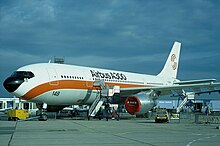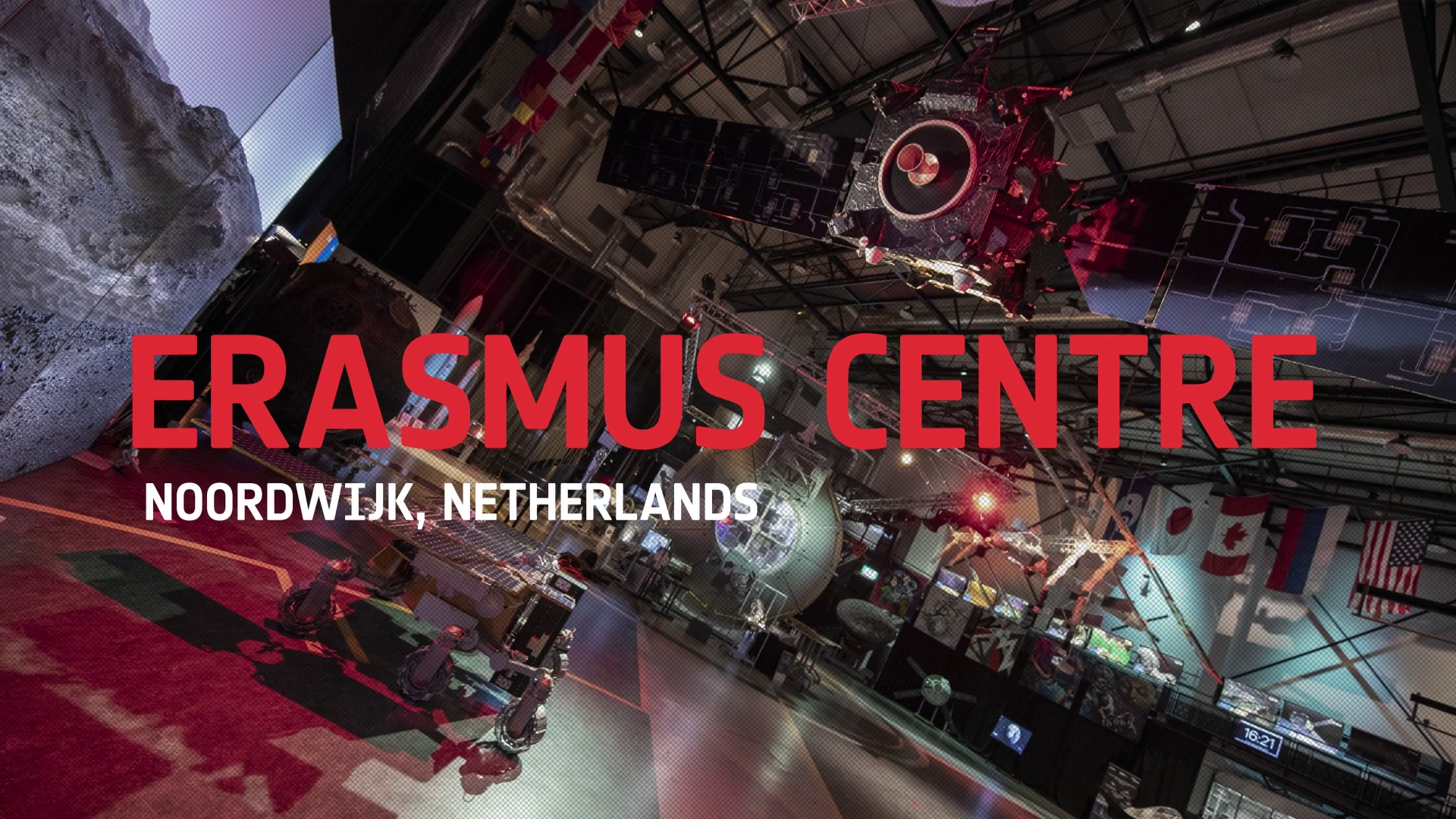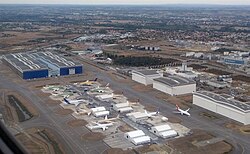Good Morning Chippers ,
A Little on Airbus ,

.
Airbus SE (
/ˈɛərbʌs/; French:
[ɛʁbys] ⓘ; German:
[ˈɛːɐ̯bʊs] ⓘ; Spanish:
[ˈejɾβus]) is a European
[8] multinational aerospace corporation. The company’s primary business is the design and manufacturing of
commercial aircraft but it also has separate
defence and space and
helicopter divisions. Since 2019, Airbus has been the world's largest manufacturer of airliners as well as the leading helicopter manufacturer.
[9][10]
The company was incorporated as the
European Aeronautic Defence and Space Company (
EADS) in the year 2000 through the merger of the French
Aérospatiale-
Matra, the German
DASA and Spanish
CASA. The new entity subsequently acquired full ownership of its subsidiary,
Airbus Industrie GIE, a
joint venture of European aerospace companies originally incorporated in 1970 to develop and produce
a wide-body aircraft to compete with American-built airliners. EADS rebranded itself as
Airbus SE in 2015. Reflecting its multinational origin, the company operates major offices and assembly plants in
France,
Germany,
Spain, and the
United Kingdom, along with more recent additions in
Canada,
China, and the
United States.
[11]
Airbus' headquarters are legally registered in
Leiden, Netherlands, but daily management is conducted from the company's main office located in
Blagnac, France.
[12] The
SE in its corporate name stands for
Societas Europaea.
[13] The company is led by CEO
Guillaume Faury and is a component of the
EURO STOXX 50 stock market index.
[14] Since its inception in 2000, the company’s shares have been listed on the
Paris Stock Exchange, the
Frankfurt Stock Exchange and the four regional Spanish stock exchanges (including the
Bolsa de Madrid).
[15]
In 2024, following similar ventures launched in
Singapore and
the Netherlands, Airbus announced its plans to establish a Tech Hub in
Japan, to foster partnerships for the next generation aircraft development.
[16]
History[edit]
Main article:
History of Airbus
The current company is the product of consolidation in the European aerospace industry, tracing back to the formation of the
Airbus Industrie GIE consortium in 1970. In 2000, the European Aeronautic Defence and Space Company (EADS)
NV was established. In addition to other subsidiaries pertaining to security and space activities, EADS owned 100% of the pre-existing
Eurocopter SA, established in 1992, as well as 80% of Airbus Industrie GIE. In 2001, Airbus Industrie GIE was reorganised as Airbus
SAS, a simplified
joint-stock company. In 2006, EADS acquired
BAE Systems' remaining 20% of Airbus.
[17] EADS NV was renamed Airbus Group NV and SE in 2014 and 2015, respectively.
[18][19][20] Due to the dominance of the Airbus SAS division within Airbus Group SE, the executive committees of the parent and subsidiary companies were aligned in January 2017, but the companies were kept as separate legal entities. The holding company was given its present name in April 2017.
[21]
Airbus
(est. 2000, renamed 2017) |
Aérospatiale-Matra
(est. 1999) | | | | DASA
(est. 1989) | | | | | CASA (Construcciones Aeronáuticas SA)
(est. 1923) | | |
|
| |
The logos of Airbus Industrie GIE and Airbus SAS displayed a stylised turbine symbol, redolent of a
jet engine, and a font similar to
Helvetica Black. The logo colours were reflected in the standard Airbus
aircraft livery in each period. The EADS logo between 2000 and 2010 combined the logos of the merged companies,
DaimlerChrysler Aerospace AG (a four-ray star) and Aérospatiale-Matra (a curved arrow), after which these elements were removed and a new font with 3D shading was chosen. This font was retained in the logos of Airbus Group NV (2014–2015) and Airbus Group SE (2015–2017), then Airbus SE:
Products[edit]
Civilian[edit]
 Airbus A300
Airbus A300, the company's first airliner and the world's first
wide-body,
twinjet aircraft
The Airbus product line started with the
A300 in 1972, the world's first
wide-body,
twinjet aircraft. The aircraft greatly benefited from the 1976 introduction of the
ETOPS 90 rule, which allowed twinjet aircraft to operate up to 90 minutes (increased from 60 minutes) away from the nearest airport. Under the new rule, the A300 was able to operate over the
North Atlantic, the
Bay of Bengal, and the
Indian Ocean more efficiently than the
trijets and
four-engined jet aircraft offered by competitors. A shorter, re-winged, re-engineered variant of the A300, known as the
A310, followed in 1982. The aircraft would remain in production until 2007.
 Airbus A320
Airbus A320, the company's best-selling airliner
Building on its success with the A300, Airbus worked to develop a narrow-body aircraft along with additional wide-body aircraft based on the A300.
The narrow-body efforts led to the launch of the
A320 in 1987, which was and continues to be a major commercial success. The A320 was the first commercial jet to use a digital
fly-by-wire control system. All Airbus aircraft developed since then have cockpit systems similar to the A320, making it easier to train crew. The success led Airbus to introduce a lengthened version, the A321 in 1993, along with the shorter A319 in 1995 and the even shorter A318 in 2002. In 2016, Airbus re-engineered the narrow-body family, in a programme called the
A320neo (
new engine option).
The wide-body programme led to the introduction of the four-engine
A340 in 1991 and the twinjet
A330 in 1992. At that time, Airbus wanted to offer
four-engined jet aircraft to allow for longer
transatlantic and
transpacific flights. However, during the aircraft's development, new rules extended twinjet operations to 120 minutes in 1986, and 180 minutes in 1989. Although the new rules hurt sales of the A340, they greatly benefited the
A330. Production of the A340 ended in 2011, while the A330 would be re-engineered as the
A330neo (
new engine option) in 2018.
The world's largest passenger airliner was introduced by Airbus in 2005; the
A380 was a four-engine aircraft with two full-length passenger seating decks. Intended to challenge the dominance of the
Boeing 747 in the
long-haul market, the A380 was ultimately a money-losing venture for Airbus due to large development costs and limited sales, and production ended in January 2022.
The
A350, a wide-body, twinjet aircraft was introduced in 2013. The A350 was the first Airbus aircraft made largely from
carbon-fiber-reinforced polymers. It is longer and wider than the fuselage used on the A300, A310, A330, and A340.
A second narrow-body jet was added to the product list in 2018 when Airbus gained control of the Bombardier CSeries programme, and rebranded it as the A220. The jet offers five-abreast seating compared to the six-abreast seating on the A320
.
Product list and details (date information from Airbus)
| Aircraft | Description | Seats | 1st flight | Production end | Orders | Deliveries | Unfilled | In operation |
|---|
| A220 | 2 engines, narrow-body | 108–130 | 16 September 2013 | | 914 | 322 | 592 | 322 |
| A300 | 2 engines, wide-body | 228–254 | 28 October 1972 | 27 March 2007 | 561 | 561 | — | 219 |
| A310 | 2 engines, wide-body | 187 | 3 April 1982 | 27 March 1998 | 255 | 255 | — | 52 |
| A320 | 2 engines, narrow-body | 107–185 | 22 February 1987 | | 18,460 | 11,328 | 7,132 | 10,630 |
| A330 | 2 engines, wide-body | 246–300 | 2 November 1992 | | 1,774 | 1,598 | 176 | 1,479 |
| A340 | 4 engines, wide-body | 239–377 | 25 October 1991 | 10 November 2011 | 377 | 377 | — | 202 |
| A350 | 2 engines, wide-body | 270–350 | 14 June 2013 | | 1,277 | 592 | 652 | 586 |
| A380 | 4 engines, wide-body, double deck | 555 | 27 April 2005 | 1 January 2022 | 251 | 251 | — | 234 |
Data as of 29 February 2024.[22]
Organisation[edit]
Divisions[edit]
Revenues by division, as of 2023:
Commercial aircraft (72%)
Defence and Space (17%)
Helicopters (11%)
Commercial Aircraft[edit]
Commercial aircraft generated 74% of total revenue for the Airbus group in 2018 and 72% in 2023.
[28][29] The key trends for Airbus Commercial Aircraft (excluding Defence, Space and Helicopters) are as of the financial year ending 31 December 2023:
[30]
Regards ,
Esq.











